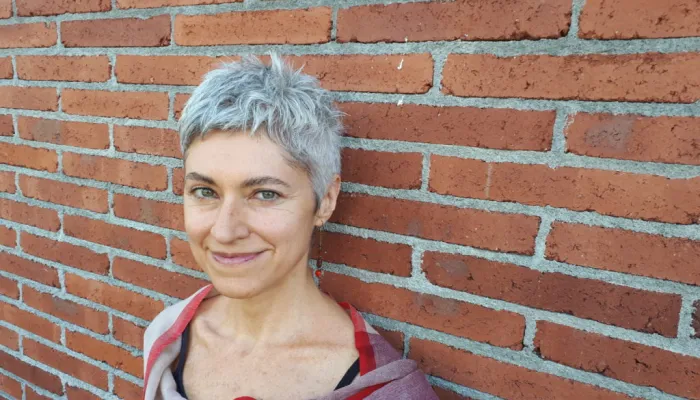Linda Besner
Biography
Linda Besner is a journalist and poet from Wakefield, Quebec, who lives in Toronto. She received a Writers’ Trust of Canada Best Emerging Writer Award, and her work has appeared in The New York Times Magazine and The Walrus. Her high-energy style draws on inventive formalism, and she often employs "nonce forms," in which the poet creates their own rules for a one-off poetic experiment. She has created forms in which words are spelled backwards; in which lines are mistranslated from French to English and English to French; and in which letters are assembled according to their colour in the Fisher Price fridge magnet set. Her often funny poems might be about Helen Keller, Montreal street names, cartwheels, or cognitive science. Her influences include the poetic experimentation of France’s Oulipo group. Her most recent book, Feel Happier in Nine Seconds, is at https://chbooks.com/Books/F/Feel-Happier-in-9-Seconds4 and she is on Twitter at @lindabesner.
Micro-interview
I remember very distinctly my first exposure to poetry in high school. It was Bronwyn Wallace's poem "Common Magic," and the line that caught my attention was "Your best friend falls in love/ and her brain turns to water." I think it was partly that friendship was so important to me as a teenager, and while love was sort of this mysterious experience that I hadn't really had yet beyond painful, unreturned crushes, I knew about friendship, and about what it felt like to observe another person--another girl--so closely that I could tell what she was thinking and feeling without her having to say anything. The intimacy of this line goes in so many directions--it's a line about someone else's feelings about yet a third person--and yet contains a cool sort of distance because the speaker isn't talking about herself. I felt a bit lonely and outside of life as a teenager. This poem made this experience seem okay and even beautiful.
I started writing poetry very young—I think I was about eight years old when I wrote my first poem. I listened to a lot of story tapes as a kid, the kind where stories are read by famous actors—Alice in Wonderland, The Wind in the Willows. I think hearing so much reading aloud gave me a feeling for the way words fit together and bounce off each other, the way they sound together. Poetry is a very ear-focussed art form for me.
I wrote stories and plays when I was young too, so I probably only really started thinking of myself as primarily a poet when I was twenty or so. When I got to university, I had a friend who was taking theatre, and we loved to read aloud together—I remember us coming across Pablo Neruda’s poem “Ode to the Orange” and reading it aloud; that was a big moment for me that got me thinking maybe this was who I wanted to be.
I think poets can have a lot of jobs: for some people it’s about rousing readers to feel the world’s injustices; for others it’s about praising the world’s beauties. Personally, I have felt like my job as a poet is to listen as closely as I can to the buzzing energy of the language itself. I think language has an existence outside of us and our desire to use it to express what we think and feel—language is a force of nature we can only dimly understand. I try to go out as far into the language as I can stand, where it might be stormy and dangerous. I might not know how to tell people what I find there, but I try to give my readers a sense of the wildness of this essential element we’re swimming in.
I’m a sucker for Dylan Thomas’ “Fern Hill.” It’s so painfully beautiful in its celebration of childhood and nature, and the language itself is so surprising while still being so graceful and feeling so natural. The rhythm has such swinging drama, having the words in my mouth makes me feel brave.


